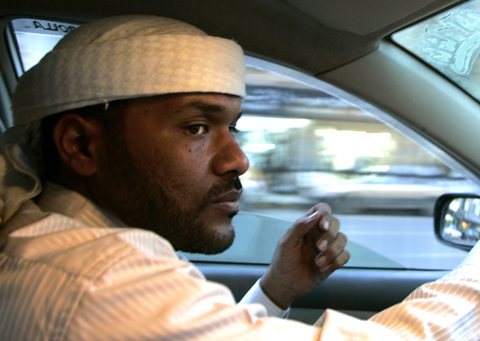
WHO IS THIS MAN, REALLY? Abu Jandal, hypocrite. |
The only thing you can say for certain about Abu Jandal, one of the subjects of Laura Poitras's dense and endlessly fascinating documentary The Oath, is that he is a hypocrite. By some accounts, he is actively recruiting young men in Yemen's capital, Sanaa, for jihad; by others, he is fraught with guilt over his former role (from 1997 until 2000) as Osama bin Laden's bodyguard, particularly because it led to his brother-in-law's prolonged captivity at Guantanamo Bay. At one point, he asserts that he would never have participated in the September 11 attacks; the next day, he renounces the statement, and asks Poitras to delete the statement from her records.
The Oath does not tell you what to make of Jandal, but does offer a candid, complex investigation of the ongoing legacy of America's War on Terror.
The film proceeds on two tracks. The more linear half of the film concerns the detainment of Salim Hamdan, Jandal's brother-in-law and Osama bin Laden's former driver. Hamdan never signed on as a member of al Qaeda, but was sold to American forces at the border between Pakistan and Afghanistan shortly after September 11 (the information he offered under interrogation is classified). In 2006, while awaiting trial by military commission, Hamdan was on the winning side of a Supreme Court case arguing that his military tribunal was an overreach of executive power. Shortly after, Congress passed the Military Commissions Act of 2006, and Hamdan was charged under new crimes created after his detainment in order to prolong it. (His lawyer, a Navy lieutenant commander who argues against the lawfulness of the tribunals, is also a ripe subject.)
As the film begins, he is in solitary confinement, awaiting his military trial. (He'll later be convicted on minor counts, but released to Yemen with credit for time served.) While we never meet Hamdan, letters he wrote to Jandal — full of sober anguish over his unjust detainment — are narrated periodically throughout the film, to a tremulous score by Osvaldo Golijov performed by Brooklyn Rider.
Poitras is much more sly, even manipulative, in her treatment of Jandal. First, he's showing his son pictures of him as a baby, lying on a blanket in Afghanistan next to an AK-47. He asks him, "Who put him [Hamdan] in prison?" "America!," the son replies. Then, we learn Jandal is a cab driver struggling to make ends meet, regularly meeting with young Yemenis and educating them about jihad. Only much later do we learn of the broad array of information Jandal supplied to the FBI after September 11, and that Jandal was released from a Yemeni prison after adopting the standards of a re-education program called the Dialogue Commission, which urges former jihadists to preach non-violence.
As The Oath progresses, you get the feeling that Poitras is trying to peel the layers off an onion, but at some point she realizes that Jandal has no center. His actions and statements are contradictory, yet individually persuasive. Here's a man wanted for assassination by al Qaeda's new guard, but is drawn enough to the limelight to participate in interviews with 60 Minutes, the New York Times, and the filmmaker, to whom he sometimes-regretfully, sometimes-proudly admits that he violated a promise to support Al Qaeda's mission in any way necessary. His eyes constantly shift tactics. They dart as he cautiously reads his surroundings, they go beady as he conveys sorrow, and they strike notes of unsettling mischief as he conveys the philosophy of his former boss, the most wanted man in the world. You can, and will, get lost in them as Jandal asserts and backpedals.